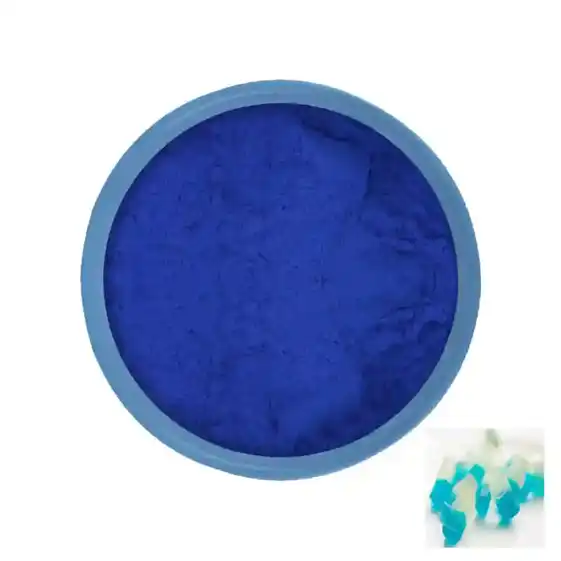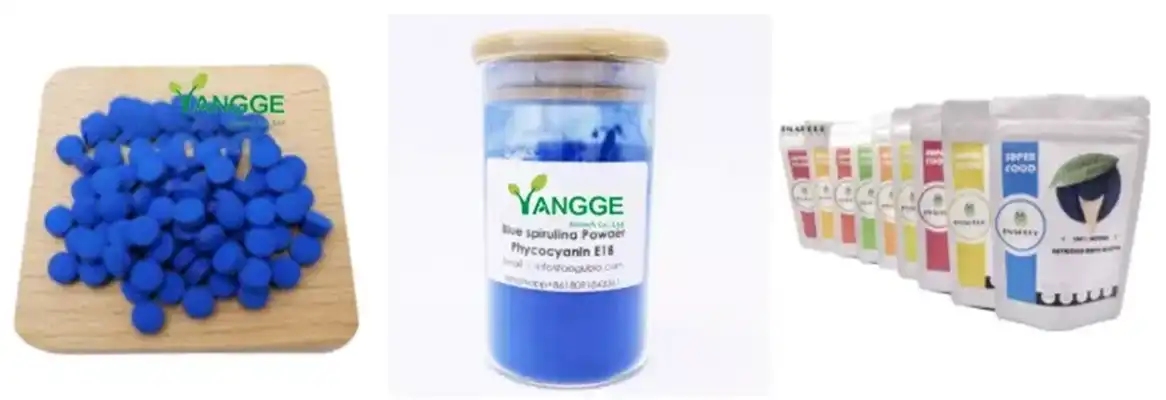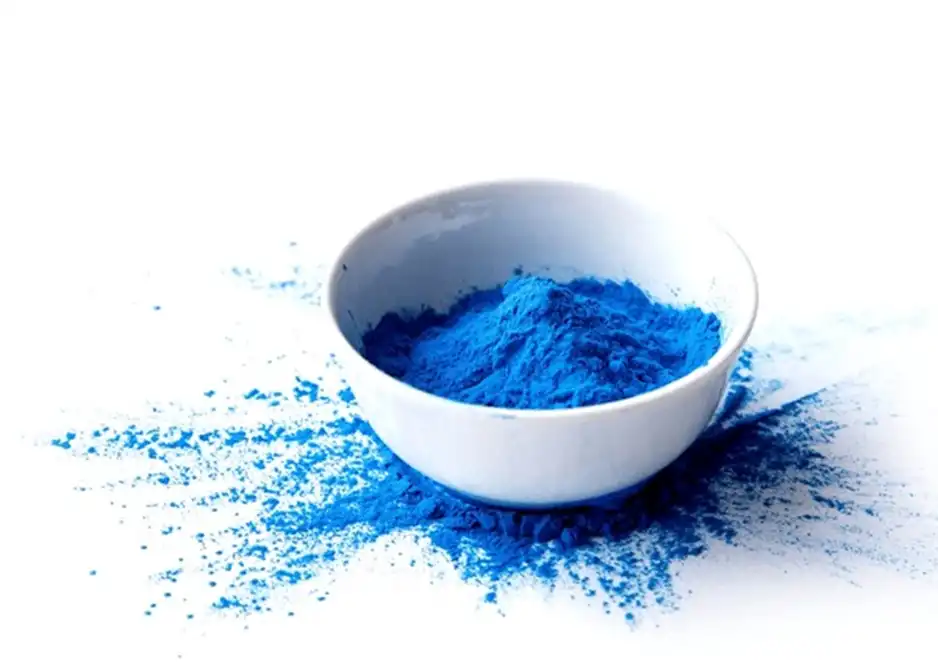Blue Spirulina: The Ultimate Superfood Nutrient
Spirulina, a blue-green alga renowned for its rich nutrient profile, is brimming with vitamins, minerals, antioxidants, and protein. Its historical significance as a superfood date back to the ancient Aztecs, who valued it for its remarkable nutritional benefits, and it was later used as a supplement for NASA astronauts during space missions. Modern research continues to uncover the diverse health benefits of spirulina, with ongoing studies exploring its potential therapeutic uses. Available in various forms such as powders, capsules, and tablets, spirulina is often incorporated into protein bars, smoothies, and juices to enhance nutritional value. This versatile superfood remains a popular choice for those seeking to boost their overall health and well-being. Spirulina is blue-green algae that is a rich source of protein and antioxidants.
Blue Spirulina Application
1. Magnesium Content: Blue spirulina algae is rich in magnesium, which supports essential functions such as muscle movement and heartbeat and is crucial for protein production and energy creation. Despite its importance, many people do not get enough magnesium in their diets.
2. High Plant Protein: Blue Spirulina is composed of 65% to 70% protein, primarily from phycocyanin, the pigment responsible for its distinctive blue-green color. This high protein content makes it a valuable addition to a balanced diet.
3. Anti-Cancer Properties: The antioxidants in spirulina, particularly phycocyanin, have anti-inflammatory effects that can help combat chronic inflammation linked to cancer. Research suggests that phycocyanin may inhibit tumor growth and kill cancer cells, making it a promising area of study for cancer treatment.
4. Heart Health: Spirulina's protein can lower cholesterol absorption, reducing cholesterol levels and preventing artery blockages. It also lowers triglycerides, reduces blood pressure by increasing nitric oxide production, and thereby decreases the risk of heart disease and stroke.
5. Allergy Relief: The anti-inflammatory antioxidants in spirulina may alleviate allergy symptoms caused by pollen, dust, and animal dander. Studies have shown that spirulina can significantly reduce symptoms like congestion, sneezing, and itching.
6. Immune System Support: Packed with essential vitamins and minerals, spirulina enhances immune function by boosting white blood cell and antibody production. It has shown potential in fighting viruses and bacteria, with ongoing research into its effectiveness against herpes, flu, and HIV.
7. Eye and Oral Health: Spirulina contains zeaxanthin, which may reduce the risk of cataracts and age-related vision loss. Its antibacterial properties support oral health by reducing dental plaque and gingivitis, and it may lower the risk of oral cancer in tobacco users.
8. Weight Loss: As a high-protein food, blue spirulina powder can help control appetite and prevent hunger. Research indicates that it may aid weight loss by increasing feelings of fullness and preventing fat accumulation in the liver. Studies have shown that spirulina supplements can enhance weight loss efforts compared to placebos.
Potential Health Benefits of Blue Spirulina
Blue Spirulina powder is a rich source of vitamins, minerals, and fatty acids. It’s also high in the plant protein phycocyanin, which has antioxidant and anti-inflammatory properties.
These nutrients in spirulina are linked to several health benefits:
Anti-cancer properties
Many antioxidants in spirulina have anti-inflammatory effects in the body. Chronic inflammation contributes to cancer and other diseases.
Phycocyanin has been found to not only reduce inflammation in the body, but also block tumor growth and kill cancer cells. The immune-enhancing protein is being studied for its potential in cancer treatment.
Heart health
Research has found that the protein in spirulina can reduce your body’s absorption of cholesterol, lowering cholesterol levels. This helps keep your arteries clear, reducing strain on your heart that can lead to heart disease and stroke-causing blood clots.
Allergy relief
The anti-inflammatory effect of spirulina’s antioxidants may help you with allergies caused by pollen, animal hair, and dust. One study found that symptoms like congestion, sneezing, and itching were reduced significantly, suggesting that spirulina may be a good alternative to allergy medications.
Immune system support
Spirulina is rich in a range of vitamins and minerals essential for maintaining a healthy immune system, like vitamins E, C, and B6. Research finds that spirulina also boosts the production of white blood cells and antibodies that fight viruses and bacteria in your body.
Laboratory studies show that spirulina can fight herpes, the flu, and HIV – though much more research is needed to test these effects in humans.
Eye and oral health
Spirulina is concentrated with zeaxanthin, a plant pigment that may reduce the risk of cataracts and age-related vision loss. Its antibacterial properties may also help promote good oral health. One study found that spirulina-enhanced mouthwash reduced dental plaque and the risk of gingivitis in the people being studied. Another study showed it lowered the risk of oral cancer in people who chew tobacco.
Weight loss
Spirulina is a source of protein, which takes longer for your body to digest and can fend off hunger. One study done on people on a low-calorie diet found that those who took a spirulina supplement shed more weight and lost more body fat, compared to those who had a placebo pill. Spirulina may also help you feel fuller and prevent fat buildup in the liver, both of which also encourage weight loss.
Blue Spirulina Nutrition Information:
One tablespoon of spirulina contains:
- Calories: 20
- Protein: 4 grams
- Fat: 1 gram
- Carbohydrates: 2 grams
- Fiber: 0 grams
- Sugar: 0 grams
- Spirulina is a good source of:
- Thiamine {Vitamin B1}
- Riboflavin {Vitamin B2}
- Niacin (vitamin B3)
- Copper
- Iron
Spirulina FAQs
What does spirulina do to the body?
Because Blue spirulina is high in nutrients and antioxidants, it may help lower inflammation in the body. It may improve your immune system and heart health, and reduce the risk of several diseases.
Is spirulina safe to take every day?
Spirulina is considered safe, even in high doses. Experts recommend getting no more than 8 grams per day.
What foods is spirulina found in?
Spirulina is a type of algae. It’s sometimes added to certain foods and beverages, such as smoothies, popcorn, and energy bars.
Is spirulina good for you to lose weight?
Spirulina is low in calories and high in protein, which can help you feel full and fend off hunger. Research suggests that it may encourage weight loss.
Spirulina vs. chlorella
Like spirulina, chlorella is nutrient-rich algae that’s used as a health supplement. But there are some differences: Spirulina has a blue hue, compared to chlorella’s vibrant green color. Chlorella is higher in vitamin A and omega-3 fats, while spirulina contains more protein and vitamins E and K.
Advantages of Spirulina in Environmental Treatment
Compared to traditional methods of pollution treatment and water purification, Spirulina algae has many outstanding advantages:
- Environmentally friendly: Do not use toxic chemicals
- Low cost: Easy to grow and propagate
- High Efficiency: Simultaneous treatment of many types of pollution
- Creating valuable products: Algae biomass can be used as food, animal feed or biofuel
- Energy saving: Processing mainly relies on solar energy
Wrapping up, Blue spirulina, a nutrient-dense blue-green algae, offers a wealth of benefits due to its high concentrations of protein, antioxidants, and essential minerals. Historically cherished by the Aztecs and utilized by NASA, spirulina continues to be a powerful supplement with applications in enhancing heart health, reducing inflammation, and supporting immune function. Modern research supports its potential in cancer prevention, allergy relief, and weight management, making it a versatile addition to any diet. With its rich nutritional profile and diverse health benefits, blue spirulina stands out as a superfood for boosting overall well-being. Incorporating blue spirulina into your routine can provide a significant health boost and support various aspects of physical health.
Where to Buy Blue spirulina powder ?
You can purchase Blue spirulina powder available with free sample at yanggebiotech.com. The company is an industry-leading manufacturer and distributor for pure dietary supplements. YANGGE BIOTECH INGREDIENTS is not just a consumer brand. It also supplies pure ingredients to other brands that distribute food and other supplement products. Contact us to place an order today.
References:
https://www.yanggebiotech.com/natural-colorants/blue-spirulina-algae
https://www.yanggebiotech.com/natural-colorants/blue-spirulina-phycocyanin-powder
· https://ods.od.nih.gov/factsheets/Spirulina-HealthProfessional/
· https://pubmed.ncbi.nlm.nih.gov/24927468/
· https://www.healthline.com/nutrition/10-proven-benefits-of-spirulina
· https://www.webmd.com/diet/spirulina-health-benefits
· https://www.researchgate.net/publication/339617444_SPIRULINA_THE_BENEFICIAL_ALGAE






